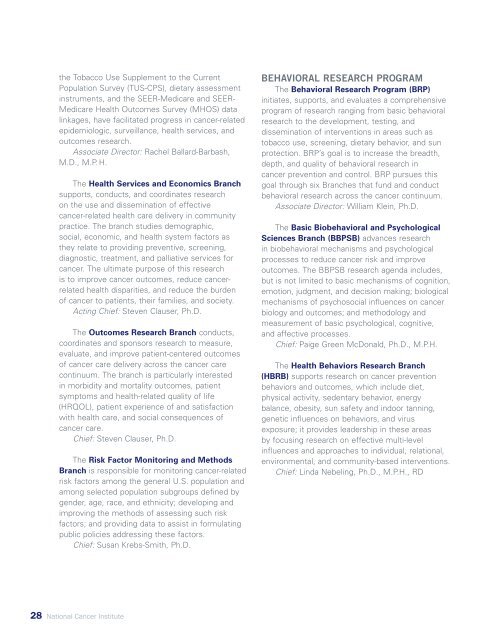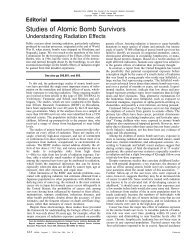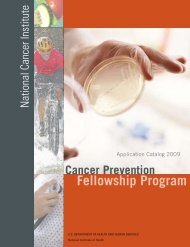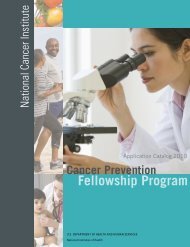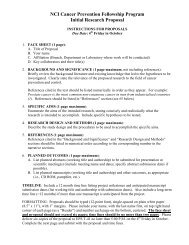Download Our Catalog - Cancer Prevention Fellowship Program
Download Our Catalog - Cancer Prevention Fellowship Program
Download Our Catalog - Cancer Prevention Fellowship Program
Create successful ePaper yourself
Turn your PDF publications into a flip-book with our unique Google optimized e-Paper software.
the Tobacco Use Supplement to the Current<br />
Population Survey (TUS-CPS), dietary assessment<br />
instruments, and the SEER-Medicare and SEER-<br />
Medicare Health Outcomes Survey (MHOS) data<br />
linkages, have facilitated progress in cancer-related<br />
epidemiologic, surveillance, health services, and<br />
outcomes research.<br />
Associate Director: Rachel Ballard-Barbash,<br />
M.D., M.P. H.<br />
The Health Services and Economics Branch<br />
supports, conducts, and coordinates research<br />
on the use and dissemination of effective<br />
cancer-related health care delivery in community<br />
practice. The branch studies demographic,<br />
social, economic, and health system factors as<br />
they relate to providing preventive, screening,<br />
diagnostic, treatment, and palliative services for<br />
cancer. The ultimate purpose of this research<br />
is to improve cancer outcomes, reduce cancerrelated<br />
health disparities, and reduce the burden<br />
of cancer to patients, their families, and society.<br />
Acting Chief: Steven Clauser, Ph.D.<br />
The Outcomes Research Branch conducts,<br />
coordinates and sponsors research to measure,<br />
evaluate, and improve patient-centered outcomes<br />
of cancer care delivery across the cancer care<br />
continuum. The branch is particularly interested<br />
in morbidity and mortality outcomes, patient<br />
symptoms and health-related quality of life<br />
(HRQOL), patient experience of and satisfaction<br />
with health care, and social consequences of<br />
cancer care.<br />
Chief: Steven Clauser, Ph.D.<br />
The Risk Factor Monitoring and Methods<br />
Branch is responsible for monitoring cancer-related<br />
risk factors among the general U.S. population and<br />
among selected population subgroups defined by<br />
gender, age, race, and ethnicity; developing and<br />
improving the methods of assessing such risk<br />
factors; and providing data to assist in formulating<br />
public policies addressing these factors.<br />
Chief: Susan Krebs-Smith, Ph.D.<br />
Behavioral Research <strong>Program</strong><br />
The Behavioral Research <strong>Program</strong> (BRP)<br />
initiates, supports, and evaluates a comprehensive<br />
program of research ranging from basic behavioral<br />
research to the development, testing, and<br />
dissemination of interventions in areas such as<br />
tobacco use, screening, dietary behavior, and sun<br />
protection. BRP’s goal is to increase the breadth,<br />
depth, and quality of behavioral research in<br />
cancer prevention and control. BRP pursues this<br />
goal through six Branches that fund and conduct<br />
behavioral research across the cancer continuum.<br />
Associate Director: William Klein, Ph.D.<br />
The Basic Biobehavioral and Psychological<br />
Sciences Branch (BBPSB) advances research<br />
in biobehavioral mechanisms and psychological<br />
processes to reduce cancer risk and improve<br />
outcomes. The BBPSB research agenda includes,<br />
but is not limited to basic mechanisms of cognition,<br />
emotion, judgment, and decision making; biological<br />
mechanisms of psychosocial influences on cancer<br />
biology and outcomes; and methodology and<br />
measurement of basic psychological, cognitive,<br />
and affective processes.<br />
Chief: Paige Green McDonald, Ph.D., M.P.H.<br />
The Health Behaviors Research Branch<br />
(HBRB) supports research on cancer prevention<br />
behaviors and outcomes, which include diet,<br />
physical activity, sedentary behavior, energy<br />
balance, obesity, sun safety and indoor tanning,<br />
genetic influences on behaviors, and virus<br />
exposure; it provides leadership in these areas<br />
by focusing research on effective multi-level<br />
influences and approaches to individual, relational,<br />
environmental, and community-based interventions.<br />
Chief: Linda Nebeling, Ph.D., M.P.H., RD<br />
28 National <strong>Cancer</strong> Institute


